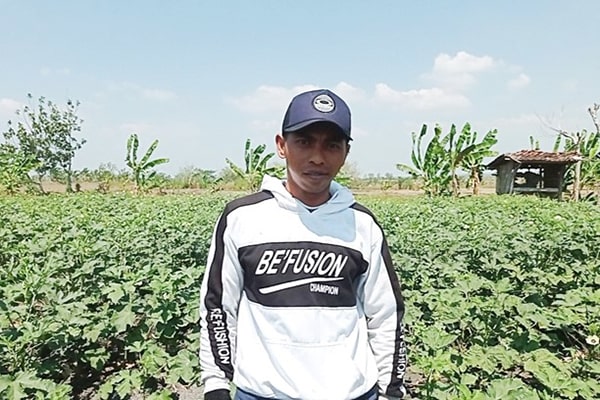DAKOTA, a digital tool that bolsters sustainable production of food export commodities in Indonesia will soon reach okra farmers of Grobogan in Central Java. The tool is a digital platform helping farmers achieve international market standards and fair prices through transparent records of the quality control and agricultural practices applied on their commodities.
 The Dakota digital platform intends to improve market opportunities for okra growers. A member of the Sekar Bumi Farmer-Livestock Group in Ketangirejo Village, Grobogan Regency, Imron Masluri has been growing okra since 2022, with a commitment to environmentally friendly farming practices and minimal use of chemical inputs. Photo by ©Penabulu Foundation.The blockchain technology behind DAKOTA creates unchangeable records of a commodity from its farm origin to retail market. A project led by the civil society organization Penabulu Foundation is adapting DAKOTA, originally designed for spice commodities, to raise the production quality, income, and market reach of 150 okra farmers in Grobogan regency.
The Dakota digital platform intends to improve market opportunities for okra growers. A member of the Sekar Bumi Farmer-Livestock Group in Ketangirejo Village, Grobogan Regency, Imron Masluri has been growing okra since 2022, with a commitment to environmentally friendly farming practices and minimal use of chemical inputs. Photo by ©Penabulu Foundation.The blockchain technology behind DAKOTA creates unchangeable records of a commodity from its farm origin to retail market. A project led by the civil society organization Penabulu Foundation is adapting DAKOTA, originally designed for spice commodities, to raise the production quality, income, and market reach of 150 okra farmers in Grobogan regency.
Penabulu Foundation is implementing the project entitled "Strengthening the supply chain and traceability for okra commodity using blockchain-based tracking and traceability tools (DAKOTA) in Grobogan, Central Java" through the Southeast Asian Regional Center for Graduate Study and Research in Agriculture (SEARCA) Grants for Research towards Agricultural Innovative Solutions (GRAINS) awarded in 2023.
The Penabulu Foundation reports that the leading agricultural commodities in Grobogan, rice and corn, are vulnerable to market price fluctuations. Okra is an alternative commodity with a more stable price, but buyers usually have the upper hand when it comes to pricing. The DAKOTA tool for okra can potentially raise the bargaining power of farmers by providing evidence of sustainable production along the supply chain. It provides an opportunity to build farmers' reputation in export markets and reward those who use good agricultural practices.
The project has kicked off by engaging the interest of Grobogan farmers and the vegetable exporter, PT Kam. Through stakeholder and farmer interviews, the Penabulu Foundation has identified good cultivation practices to tailor-fit the DAKOTA prototype for okra farmers.
Mr. Imron Masluri, an okra grower from Grobagan, looks forward to benefitting from the project. "As farmers, we hope that our agricultural products will be sold at a fair price and be treated as valuable food products," Mr. Masluri said. "I believe that DAKOTA, a quality control system for okra cultivation and postharvest practices, can help increase the sale value and improve the quality of okra. Ongoing discussions about okra cultivation and postharvest practices provide an opportunity to identify the best patterns for farming okra and possibly other horticultural crops," he continued.
Atty. Eric Reynoso, SEARCA program head, Emerging Innovation for Growth Department (EIGD), welcomed the DAKOTA project as a demonstration of agritechnology power. "SEARCA GRAINS supports digital innovations that reward sustainable practices, making a difference in the lives of farmers and rural communities," Atty. Reynoso stated.